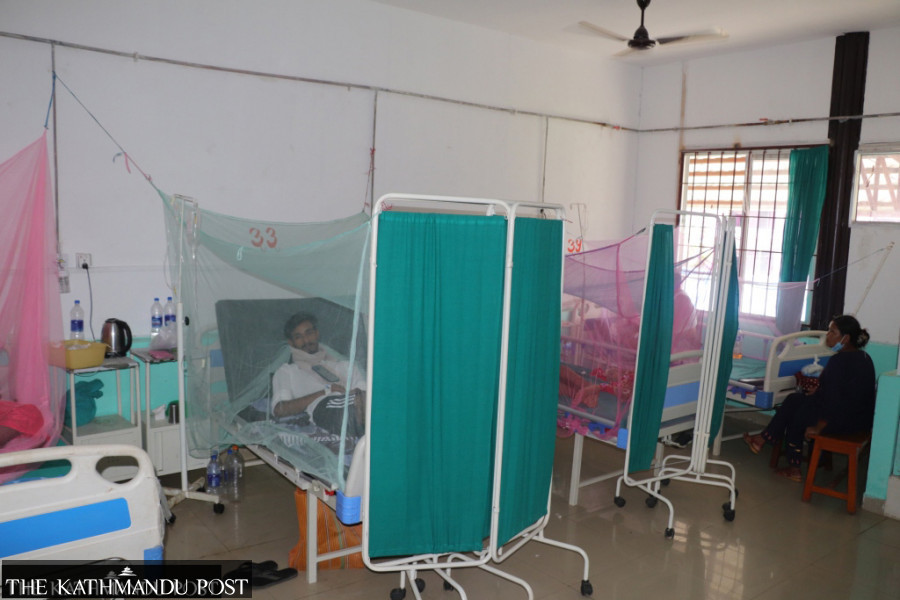Health
Dengue crisis deepens as authorities fail to prioritise mosquito control
Experts: Government bid to hide cases and deaths is worsening the public health crisis.
Arjun Poudel
A 60-year-old man from ward 7 of Bidur Municipality in Nuwakot district, succumbed to dengue on Wednesday night.
The man was first rushed to Tribhuvan University Teaching Hospital (TUTH) on Monday night as his condition deteriorated, and later to a private hospital for intensive care due to a lack of vacant intensive care unit beds at the TUTH.
Doctors attending the victim suffered from severe dengue, which led to shock, internal bleeding and multiorgan failure.
Officials at the Ministry of Health and Population, however, claimed that dengue was not the direct cause of death, as the victim also had high blood pressure.
They claimed that while infection rates have increased of late, the number of severe cases and deaths has not increased proportionately. But experts say the situation is far worse than what the authorities admit.
The rise in infection rate has not only overwhelmed general hospitals of the Kathmandu Valley, but also caused an acute blood crisis, increased premature birth, low birth weight, and a shortage of paracetamol in pharmacies.
“Many patients suffering from dengue shock syndrome, hemorrhagic fever, pneumonia, diarrhoea, and multi-organ failure due to severe dengue have been admitted to our hospital,” said Dr Niraj Bam, an associate professor at the Institute of Medicine, TUTH. “Agencies responsible must take measures immediately to break the chain of the infection and prevent an exponential rise in new cases.”
Public health experts blame the apathy of health agencies and government for the exponential rise in cases. They say neither the concerned health agencies nor the government are taking the situation seriously.
“Previously, we used to carry out search and destroy drives frequently to destroy mosquito breeding sites, launch awareness drives, and request security agencies for blood donations to manage the dengue epidemic,” said Dr Baburam Marasini, former director at the Epidemiology and Disease Control Division. “But now, no measures are being taken to control the spread of the virus. None of the agencies has considered dengue as a public health emergency.”
Experts said more concerning is the fact that the authorities have been attempting to conceal the infection and death rates to avoid criticism, and this is worsening the impact on the general public.
“Hundreds of people wait for hours every day for blood at blood banks for their seriously ailing relatives admitted at various hospitals in Kathmandu Valley,” said Sandesh Thapa, a public relations officer at the Central Blood Transfusion Service (blood bank). “But the collection is too low. Even organisations in districts outside the Valley are unable to organise blood donation camps.”
Officials at the blood bank said daily demand is around 400 pints, mostly from dengue patients, while donations are only around 30 to 40 pints.
“Since the morning, I have received around 40 calls from organisations that previously organised blood donation camps, asking for blood for their former donors,” said Thapa. “But blood can’t be manufactured or bought, and the rise in dengue cases along with the festive season has reduced donations.”
Blood bank officials have been asking the relatives of patients to find donors on their own and to post donation requests on social media.
Public health experts warn of dire consequences if the seriousness of the dengue outbreak continues to be undermined. They say that the rise in premature births, low birth weights of newborns, and complications in pregnancy will lead to maternal and child mortality rates and jeopardise the achievements made from years of investments and endeavours.
“A lot of people have been hospitalised, and hundreds more have been infected. Their experiences are harrowing,” said Dr Ghanshyam Gurung, executive director at the TUTH. “Authorities should not wait for the temperature to drop and the infection rate to decline naturally.”
Dengue is a mosquito-borne disease transmitted by female Aedes aegypti and Aedes albopictus mosquitoes. The same vector also transmits chikungunya, yellow fever, and Zika viruses, according to the World Health Organisation.
So far, only 11 people have died, and over 22,000 have been infected since the start of 2024 if the government data is to be believed. Experts say reported dengue cases may only represent a small fraction of the true scale of the outbreak, as around 90 percent of the infected people do not show any symptoms and health authorities often concealed the actual number of deaths and infections.
As there is no specific treatment for dengue, health workers provide symptomatic care and diagnose patients based on symptoms, including platelet-rich plasma transfusion.
According to doctors, mild to high fever, severe muscle pain, rashes, severe headache, and pain in the eyes are some symptoms of dengue.
The World Health Organisation (WHO) says there is no specific treatment for severe dengue, but early detection and access to proper medical care can save lives.
Meanwhile, in view of the rising dengue cases, a meeting of the Council of Ministers on Thursday has decided to conduct a 10-minute cleanup campaign in all government offices at 10 am on Friday to remove mosquito breeding sites. The decision was made on the recommendation of the Ministry of Health. Officials said staffers will look for stagnant water in puddles, discarded tyres and bottles, among other things, during the campaign.




 19.12°C Kathmandu
19.12°C Kathmandu















